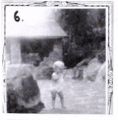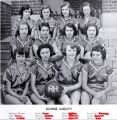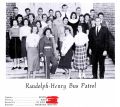Difference between revisions of "User:NightcoreSwift004"
| Line 10: | Line 10: | ||
After Bob was born, presumably taking the recommendation of his wife and his father-in-law, Robert worked as a pharmacist for a few years before they moved back to Alabama in the early 1930s, living in {{w|Sylacauga, Alabama|Sylacauga}}. There, he worked for almost 20 years as a supply office worker for textile industry {{w|Avondale Mills}} (excluding a few years of military works for World War 2), where his siblings was also working at. Jean would later also briefly work at Avondale. Despite his steady employment, which provided an income of around $32,000 annually, the family faced financial struggles, as later recounted by Bob in a letter detailing their issues with poverty. Robert's wife, Jean, would unexpectedly pass away at a young age of 39 in May 1945, shortly before Bob finished high school. Robert Sr would later get remarried in April 1949 to Dorothy Julia Wolfe—the daughter of a lumber grader—who has a daughter from a previous marriage and he would later adopt her. | After Bob was born, presumably taking the recommendation of his wife and his father-in-law, Robert worked as a pharmacist for a few years before they moved back to Alabama in the early 1930s, living in {{w|Sylacauga, Alabama|Sylacauga}}. There, he worked for almost 20 years as a supply office worker for textile industry {{w|Avondale Mills}} (excluding a few years of military works for World War 2), where his siblings was also working at. Jean would later also briefly work at Avondale. Despite his steady employment, which provided an income of around $32,000 annually, the family faced financial struggles, as later recounted by Bob in a letter detailing their issues with poverty. Robert's wife, Jean, would unexpectedly pass away at a young age of 39 in May 1945, shortly before Bob finished high school. Robert Sr would later get remarried in April 1949 to Dorothy Julia Wolfe—the daughter of a lumber grader—who has a daughter from a previous marriage and he would later adopt her. | ||
In 1955, Robert and his family moved to {{w|Winston-Salem}}, North Carolina & settled at the 6-room apartment in the neighborhood of Piedmont Park right next to {{w|Smith Reynolds Airport}}, where they stayed for the next 12 years. Robert soon found employment as a merchant patrolman (or security guard) for a {{w|Western Electric}}'s plant building, the same company his son Bob was working at as an electrical engineer. In February 1967, however, Robert Sr was told by his landlord that he has been evicted from his Piedmont Park apartment home with no reason given, and as a result, Robert took legal action against Winston-Salem Housing Authority over Forsyth Superior Court to keep his family home. The Chandlers were allowed to remain in their Piedmont Park apartment while the case were on appeal and ongoing, but they would later lose the case in the same year, subsequently moving to a 6-room house in the neighborhood of Forest Park, nearby {{w|Bowman Gray Stadium}} & {{w|Winston-Salem State University}}. Robert would later retire in 1970 at age 64, after 15 years in the security service and later passed away in December 1977 at age 71 due to short illness. | In 1955, Robert and his family moved to {{w|Winston-Salem}}, North Carolina & settled at the 6-room apartment in the neighborhood of Piedmont Park right next to {{w|Smith Reynolds Airport}}, where they stayed for the next 12 years. Robert soon found employment as a merchant patrolman (or security guard) for a {{w|Western Electric}}'s plant building, the same company his son Bob was working at as an electrical engineer. In February 1967, however, Robert Sr was told by his landlord that he has been evicted from his Piedmont Park apartment home with no reason given, and as a result, Robert took legal action against Winston-Salem Housing Authority over Forsyth Superior Court to keep his family home. The Chandlers were allowed to remain in their Piedmont Park apartment while the case were on appeal and ongoing, but they would later lose the case in the same year, subsequently moving to a 6-room house in the neighborhood of Forest Park, nearby {{w|Bowman Gray Stadium}} & {{w|Winston-Salem State University}}. Robert would later retire in 1970 at age 64, after 15 years in the security service and later passed away in December 1977 at age 71 due to short illness. He was Chris' last grandparent to die. | ||
From 1950 to 1962, Robert and his wife Dorothy had seven children, including Wayne Chandler in January 1955 and twin daughters Betty & Joan Chandler in April 1962. From various newspapers, Robert was regarded as a great loving husband and father, who had a hard time fighting tooth and nail for his family to survive. One of the examples is in 1966, believing his 16-year old son Ray would have been electrocuted at his job, rushed to his work place to save him and called fire department and rescue team after he failed to find him in the building. | From 1950 to 1962, Robert and his wife Dorothy had seven children, including Wayne Chandler in January 1955 and twin daughters Betty & Joan Chandler in April 1962. From various newspapers, Robert was regarded as a great loving husband and father, who had a hard time fighting tooth and nail for his family to survive. One of the examples is in 1966, believing his 16-year old son Ray would have been electrocuted at his job, rushed to his work place to save him and called fire department and rescue team after he failed to find him in the building. | ||
Revision as of 00:56, 13 April 2024
Chris' ancestors sandbox test for a page
Robert Franklin Chandler Sr
Robert Franklin Chandler Sr. (8 February, 1906 - 27 December, 1977) was Bob's father and Chris's paternal grandfather.
Born and raised in a rural area of Chilton County, Alabama, he was the son of a farmer and a day laborer, and was the 9th out of 12 children in the Baptist family, 3 of whom died infancy. After dropping out of high school in his freshman year, he worked at a steel mill before moving to the Dallas-Fort Worth area at age 18, where he found work as an insurance agent. In June 1962, Robert, a Baptist, married Jean Hollomon, a Methodist—the daughter of a pharmacist—when they were both at a young age of 20, eventually having their only child, Bob, a year later.
After Bob was born, presumably taking the recommendation of his wife and his father-in-law, Robert worked as a pharmacist for a few years before they moved back to Alabama in the early 1930s, living in Sylacauga. There, he worked for almost 20 years as a supply office worker for textile industry Avondale Mills (excluding a few years of military works for World War 2), where his siblings was also working at. Jean would later also briefly work at Avondale. Despite his steady employment, which provided an income of around $32,000 annually, the family faced financial struggles, as later recounted by Bob in a letter detailing their issues with poverty. Robert's wife, Jean, would unexpectedly pass away at a young age of 39 in May 1945, shortly before Bob finished high school. Robert Sr would later get remarried in April 1949 to Dorothy Julia Wolfe—the daughter of a lumber grader—who has a daughter from a previous marriage and he would later adopt her.
In 1955, Robert and his family moved to Winston-Salem, North Carolina & settled at the 6-room apartment in the neighborhood of Piedmont Park right next to Smith Reynolds Airport, where they stayed for the next 12 years. Robert soon found employment as a merchant patrolman (or security guard) for a Western Electric's plant building, the same company his son Bob was working at as an electrical engineer. In February 1967, however, Robert Sr was told by his landlord that he has been evicted from his Piedmont Park apartment home with no reason given, and as a result, Robert took legal action against Winston-Salem Housing Authority over Forsyth Superior Court to keep his family home. The Chandlers were allowed to remain in their Piedmont Park apartment while the case were on appeal and ongoing, but they would later lose the case in the same year, subsequently moving to a 6-room house in the neighborhood of Forest Park, nearby Bowman Gray Stadium & Winston-Salem State University. Robert would later retire in 1970 at age 64, after 15 years in the security service and later passed away in December 1977 at age 71 due to short illness. He was Chris' last grandparent to die.
From 1950 to 1962, Robert and his wife Dorothy had seven children, including Wayne Chandler in January 1955 and twin daughters Betty & Joan Chandler in April 1962. From various newspapers, Robert was regarded as a great loving husband and father, who had a hard time fighting tooth and nail for his family to survive. One of the examples is in 1966, believing his 16-year old son Ray would have been electrocuted at his job, rushed to his work place to save him and called fire department and rescue team after he failed to find him in the building.
Joseph Otto Weston
Joseph Otto "Joe" Weston (3 October, 1896 - 8 April, 1955), was Barb's father and Chris's maternal grandfather.
Robert Wynn (rewritting)
John James Hollomon (rewriting)
Joseph Jesse Chandler
Caleb Headley
William Teer
Bob's matrilineal great-grandfather, Dr. William M. Teer (March 29, 1837 - October 19, 1919), was born in Neshoba County, Mississippi, and grew up in Angelina County, Texas since he was 10 years old with his seven siblings. The family later relocated to Hopkins County outside Cumby in 1860, where he worked as a farmer before enlisting in the army for the Civil War.
In October 1861, aged 24, William and his two brothers James (1830 - 1863) and Wiley (1839 - 1862), enlisted in the Confederate Army in San Antonio. Serving in the 4th Texas Cavalry Regiment, William participated in the New Mexico campaign under General Sibley. Both of his brothers died during the war; James died at a Union prison camp in Williamsburg, Virginia, in 1863. William and Wiley fought in the battles of Valverde and later to Glorietta Pass, where in April 1862, Wiley was reportedly "lost or killed" and William suffered serious injuries, including a shattered right arm, a damaged spleen, and later contracting hepatitis (It might be worth reflecting how close Teer was to dying at this point - a slightly different outcome could have prevented all of Christory a century before it began). After the capture of Texas Army's supply wagons by the US Army, they retreated, leaving William and other recovering soldiers at the Santa Fe hospital before shortly being captured. He was later paroled in May 1862, returning to San Antonio. Due to his injuries and disability, he was honorably discharged from his unit by General Thomas Green in September 1863 and returned to his home in Cumby, working as a farmer despite his shattered right arm.
William was married four times throughout his life. In December 1862, he married Mary Frances Carraway of Alabama, who passed away in 1867. He then remarried Louisa Frances Spears of Tennesse, in 1868, but that marriage also ended early. In January 1871, he married Nancy Jane Coburn of Ashley County, Arkansas. From this marriage, he had seven children, including Mary Francis Teer, Bob's maternal grandmother and the wife of John James Hollomon. After Nancy's death in 1894, William remarried to Bettie King of Mount Pleasant in March 1907 at age 70, and this marriage lasted until his death in 1919.
In November 1903, inspired by the nerve damage in his shattered right arm, William established himself as an osteopath doctor in Tyler, Texas, specializing in "Exophthalmic Goitre, Biliary Calculi (Gall Stones) Paralysis, and all Nervous Diseases." He became the president of the State Association of Drugless Doctors of Texas and advocated massaging and other holistic approaches to wellness. As a doctor in Tyler, he was described as a highly respected figure, endorsed by many prominent members of the city's society. After retiring, he resided at the Texas Confederate Home in Austin before moving back to Cumby in 1918, where he later passed away in October 1919 at his youngest daughter's Miller Grove home caused by a second paralyzing stroke.
William was mentioned in a book titled "Texans who Wore the Gray (1907)", written by a Confederate officer, journalist, and author Sidney Smith Johnson (1840-1910). Johnson described William as "a brave Confederate soldier, a man of fine education, and a Christian gentleman."
Joseph Chandler (rewriting)
Sandbox page test
| barb high school photos |
|---|















